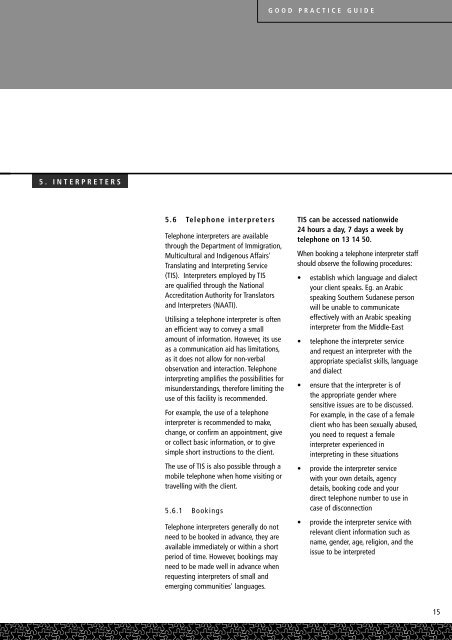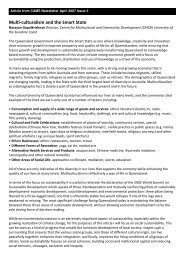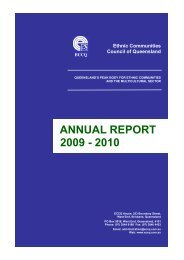Good Practice Guide
CALD Good practice guide
CALD Good practice guide
Create successful ePaper yourself
Turn your PDF publications into a flip-book with our unique Google optimized e-Paper software.
GOOD PRACTICE GUIDE<br />
5. INTERPRETERS<br />
5.6 Telephone interpreters<br />
Telephone interpreters are available<br />
through the Department of Immigration,<br />
Multicultural and Indigenous Affairs'<br />
Translating and Interpreting Service<br />
(TIS). Interpreters employed by TIS<br />
are qualified through the National<br />
Accreditation Authority for Translators<br />
and Interpreters (NAATI).<br />
Utilising a telephone interpreter is often<br />
an efficient way to convey a small<br />
amount of information. However, its use<br />
as a communication aid has limitations,<br />
as it does not allow for non-verbal<br />
observation and interaction. Telephone<br />
interpreting amplifies the possibilities for<br />
misunderstandings, therefore limiting the<br />
use of this facility is recommended.<br />
For example, the use of a telephone<br />
interpreter is recommended to make,<br />
change, or confirm an appointment, give<br />
or collect basic information, or to give<br />
simple short instructions to the client.<br />
The use of TIS is also possible through a<br />
mobile telephone when home visiting or<br />
travelling with the client.<br />
5.6.1 Bookings<br />
Telephone interpreters generally do not<br />
need to be booked in advance, they are<br />
available immediately or within a short<br />
period of time. However, bookings may<br />
need to be made well in advance when<br />
requesting interpreters of small and<br />
emerging communities' languages.<br />
TIS can be accessed nationwide<br />
24 hours a day, 7 days a week by<br />
telephone on 13 14 50.<br />
When booking a telephone interpreter staff<br />
should observe the following procedures:<br />
• establish which language and dialect<br />
your client speaks. Eg. an Arabic<br />
speaking Southern Sudanese person<br />
will be unable to communicate<br />
effectively with an Arabic speaking<br />
interpreter from the Middle-East<br />
• telephone the interpreter service<br />
and request an interpreter with the<br />
appropriate specialist skills, language<br />
and dialect<br />
• ensure that the interpreter is of<br />
the appropriate gender where<br />
sensitive issues are to be discussed.<br />
For example, in the case of a female<br />
client who has been sexually abused,<br />
you need to request a female<br />
interpreter experienced in<br />
interpreting in these situations<br />
• provide the interpreter service<br />
with your own details, agency<br />
details, booking code and your<br />
direct telephone number to use in<br />
case of disconnection<br />
• provide the interpreter service with<br />
relevant client information such as<br />
name, gender, age, religion, and the<br />
issue to be interpreted<br />
15
















